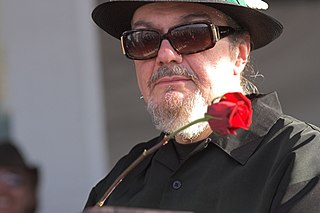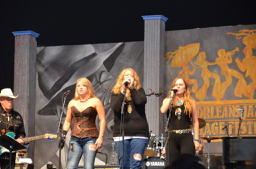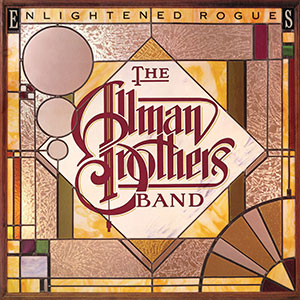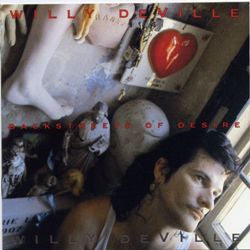Related Research Articles
Elijah Blue Allman, known professionally as P. Exeter Blue I , is an American musician, and the son of singer Cher and her second husband, Gregg Allman; he is the half-brother of Chaz Bono, Delilah Allman, Michael Allman, Layla Allman, and Devon Allman. He is the lead vocalist, guitarist and lyricist of the industrial metal band Deadsy.

Derek and the Dominos was an English–American blues rock band formed in the spring of 1970 by singer-guitarist Eric Clapton, keyboardist-singer Bobby Whitlock, bassist Carl Radle and drummer Jim Gordon. All four members had previously played together in Delaney & Bonnie and Friends, during and after Clapton's brief tenure with Blind Faith. Dave Mason supplied additional lead guitar on early studio sessions and played at their first live gig. Another participant at their first session as a band was George Harrison, the recording for whose album All Things Must Pass marked the formation of Derek and the Dominos.

Malcolm John Rebennack, Jr., better known by his stage name Dr. John, was an American singer, songwriter and pianist. His music combined New Orleans blues, jazz, R&B, soul and funk.

Gregory LeNoir Allman was an American musician, singer and songwriter. He was known for performing in the Allman Brothers Band. Allman grew up with an interest in rhythm and blues music, and the Allman Brothers Band fused it with rock music, jazz, and country. He wrote several of the band's most popular songs, including "Whipping Post", "Melissa", and "Midnight Rider". Allman also had a successful solo career, releasing seven studio albums. He was born and spent much of his childhood in Nashville, Tennessee, before relocating to Daytona Beach, Florida and then Macon, Georgia.

Stanley Road is the third solo studio album by the English singer-songwriter and musicianPaul Weller, released by Go! Discs in 1995. The album took its name from the street in Woking where Weller grew up. Weller's cover version of the song "I Walk on Guilded Splinters" was featured in the series ending montage of The Wire's fourth series end, Final Grades.

Curtis John Arceneaux better known by the name Coco Robicheaux, was an American blues musician and artist, from Ascension Parish, Louisiana, United States.

Warren Haynes is an American musician, singer and songwriter. He is best known for his work as longtime guitarist with the Allman Brothers Band and as founding member of the jam band Gov't Mule. Early in his career he was a guitarist for David Allan Coe and The Dickey Betts Band. Haynes also is known for his associations with the surviving members of the Grateful Dead, including touring with Phil Lesh and Friends and the Dead. In addition, Haynes founded and manages Evil Teen Records.

Win, Lose or Draw is the fifth studio album and sixth overall by American rock group the Allman Brothers Band. Produced by Johnny Sandlin and the band themselves, it was released on August 22, 1975 in the United States by Capricorn Records. It was the last studio album to feature bassist Lamar Williams and pianist Chuck Leavell.

Gris-Gris is the debut album by American musician Dr. John. Produced by Harold Battiste, it was released on Atco Records in 1968. The album introduced Rebennack's Dr. John character, inspired by a reputed 19th century voodoo doctor. The style of Gris-Gris is a hybrid of traditional New Orleans R&B elements and psychedelia. It was recorded in California, albeit with several native New Orleans musicians.

Enlightened Rogues is the sixth studio album by American rock band the Allman Brothers Band. Produced by Tom Dowd, the album was released in February 1979 in the United States by Capricorn Records and PolyGram Records elsewhere. The Allman Brothers Band had broken up in 1976 following internal turmoil, amplified by escalating drug use. The band members splintered into different acts — among those Great Southern, Sea Level, and the Gregg Allman Band. Guitarist Dickey Betts approached his bandmates in 1978 with the prospects of a reunion. It is the first to feature guitarist Dan Toler and bassist David Goldflies. Living together in Sarasota, Florida, they rehearsed and wrote the material for their next album in fall 1978.
Johnny Edward Jenkins was an American left-handed blues guitarist, who helped launch the career of Otis Redding. His flamboyant style of guitar playing also influenced Jimi Hendrix.

Ton-Ton Macoute! is the 1970 debut solo album of American blues musician Johnny Jenkins. Jenkins had previously led The Pinetoppers, a band which at one time featured Otis Redding. Jenkins then appeared on two Redding albums, playing guitar, before releasing his solo debut.
"These Days" is a song written by Jackson Browne and recorded by numerous artists. Browne wrote the song at age 16; its lyrics deal with loss and regret. It was first recorded by Nico in 1967 for her album Chelsea Girl, and Nico's arrangement was recorded by several other artists. Tom Rush recorded the song with a string arrangement for his album Tom Rush in 1970. Gregg Allman recorded a new arrangement of the song for his 1973 LP Laid Back, and Browne released his own version, based on Allman's arrangement, on For Everyman, also in 1973. "These Days" has since been recorded by many other artists, and remains one of Browne's most enduring compositions.
"I'm No Angel" is a rock song written by Tony Colton and Phil Palmer, and first recorded by Bill Medley of The Righteous Brothers on his 1982 solo album Right Here and Now. It gained greater fame when it was covered by American Southern rock band the Gregg Allman Band as the title track and lead single of their 1987 album I'm No Angel, released on Epic Records. The song was an unexpected hit, gaining heavy album-oriented rock airplay and reaching number one on Billboard's Album Rock Tracks chart.

Backstreets of Desire is an album by Willy DeVille. It was recorded in various Los Angeles recording studios in 1992. To make the album, DeVille was joined by many prominent musicians, including Dr. John, David Hidalgo of Los Lobos, Zachary Richard, Jim Gilstrap, Freebo, Efrain Toro, and Jimmy Zavala.

Laid Back is the debut solo studio album by American singer-songwriter Gregg Allman, released in October 1973 by Capricorn Records. Allman, best known as the vocalist/lyricist/organist of the Allman Brothers Band, first began considering a solo career after internal disagreements with that group. He developed the album as a small creative outlet wherein he would assume full control, and he co-produced the album alongside Johnny Sandlin. Laid Back was largely recorded in March 1973 at Capricorn Sound Studios in Macon, Georgia, with additional recording and mixing taking place at the Record Plant by Manhattan Recording Engineer, Jim Reeves in New York City.

After the Ball is an album by the American folk musician John Fahey, released in 1973. It was his second and last recording on the Reprise label and like its predecessor, Of Rivers and Religion, it sold poorly.
Bill Davis is an American guitarist, vocalist, and songwriter. He is the founder, lead guitarist, and lead vocalist of the rock band Dash Rip Rock, and a member of the Louisiana Music Hall of Fame. Davis founded Dash Rip Rock in 1984 and is often credited as a pioneer of cowpunk, a genre that combines country and punk rock, but Davis has said in interviews that he considers his music to be widely roots-based. His work has been inspired by a variety of styles, including rock, country, power pop, punk, soul and, at times, Cajun.

Walk on Jindal's Splinters is a live album by Jello Biafra and the Raunch and Soul All-Stars, a group of Southern musicians assembled especially for the occasion by Dash Rip Rock's Bill Davis and Cowboy Mouth's Fred LeBlanc. The album title is a play on the Dr. John song "I Walk on Gilded Splinters" meant to insult now-former Louisiana governor Bobby Jindal.

An Anthology Vol. II is an album by Duane Allman. It is a compilation of songs on which Allman plays guitar. On some tracks he plays as a session musician on recordings by other artists, including Aretha Franklin, Otis Rush, Ronnie Hawkins, Wilson Pickett, and Boz Scaggs. Other tracks feature Allman as a member of various bands, most famously the Allman Brothers Band. He sings lead vocals on three songs – "Happily Married Man", "No Money Down", and "Dimples". Six of the 21 tracks were previously unreleased.
References
- ↑ "I Walk On Guilded Splinters", BMI Repertoire. Retrieved 8 October 2014
- ↑ The Mojo Collection: 4th Edition, Canongate Books, 2007, p.133
- ↑ Ned Sublette, "Coco Robicheaux", BOMB, 19 February 2008. Retrieved 8 October 2014
- ↑ Lichtenstein, Grace; Laura Dankner (1993). Musical Gumbo: The Music of New Orleans . W.W. Norton. ISBN 0-393-03468-2.
- 1 2 Unterberger, Richie (1968). Gris-Gris (CD liner). Dr. John. Collectors' Choice Music. 131.
- ↑ Richie Unterberger, Liner notes for Gris-Gris. Retrieved, 8 October 2014
- ↑ Tom Moon, "Gris-Gris", Rolling Stone, 14 October 1999 Archived 28 June 2011 at the Wayback Machine . Retrieved 8 October 2014
- ↑ Thom Jurek, "Gris-Gris", Allmusic.com. Retrieved 8 October 2014
- ↑ Cher, "I Walk on Gilded Splinters", Discogs.com. Retrieved 8 October 2014
- ↑ Marsha Hunt, "Walk on Gilded Splinters", Discogs.com. Retrieved 8 October 2014
- ↑ Betts, Graham (2004). Complete UK Hit Singles 1952–2004 (1st ed.). London: Collins. p. 369. ISBN 0-00-717931-6.
- ↑ James Chrispell, "Johnny Jenkins – Ton-Ton Macoute", Allmusic.com. Retrieved 8 October 2014
- ↑ An Anthology Volume II, Allmusic.com. Retrieved 8 October 2014
- ↑ "The Allman Brothers Band – Instant Live: Fox Theatre – Atlanta, GA, 9/26/04", Allmusic.com. Retrieved 8 October 2014
- ↑ Stephen Thomas Erlewine, "Humble Pie- Performance – Rockin' the Fillmore: The Complete Recordings", Allmusic.com. Retrieved 8 October 2014
- ↑ Erlewine, Stephen Thomas. "Review: Stanley Road – Paul Weller". Macrovision Corporation . Retrieved 15 August 2009.
- ↑ https://www.discogs.com/release/1226228-Oasis-Go-Let-It-Out [ bare URL ]
- ↑ https://www.whosampled.com/sample/27278/Oasis-Go-Let-It-Out-Johnny-Jenkins-I-Walk-on-Guilded-Splinters/ [ bare URL ]